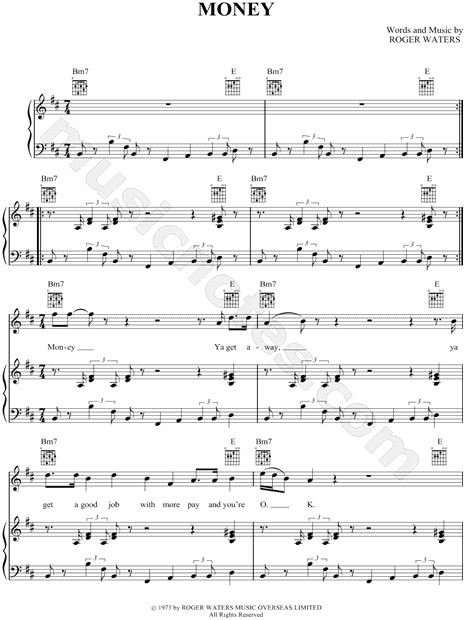Seeing untransposed piano scores like that really drives home why bass guitar scores are transposed 
I grew up playing piano, so yeah, I can read music. It seems like it would be harder to start without having some kind of note-reading background, but plenty of people make it work just fine.
@Lanny thanks for posting that sheet for Money! I love that low B, which is why I play a 5 string.
I hope you don’t mind, but I downloaded the image and printed it out. It now reposes on my music stand ready for me to play tomorrow.
Not at all @PamPurrs… Having that low B on your 5 string should really put character into that riff! Let me know if you’d like pics of the entire score and I’ll message them to you. There are some additional bass notes along with changes from 7/4 to 6/4 and 4/4…
One thing to remember is that the bass is a transposing instrument, but that sheet music for Money is an untransposed piano score. So for bass, shift everything up an octave to get to where bass sheet music is notated. Unfortunately, that’s not the low B like it appears to be 
@howard yeah, I noticed it didn’t sound quite right so I raised it an octave and it sounds much better. Thanks!
Yeah, the original is certainly not played on a 5-string with a low B…
Here is another way of notating it (note, the rhythm is also notated slightly differently, but I wouldn’t worry too much about that):
Come to think of it, isn’t “Money” in the book we got along with the course??
Ha, yes it is, it turns out.
Hehe, thanks for checking! I was too lazy to get into the next room and check for myself 
Yes it is, but that book only has tab, no musical notation. Mine was immediately tossed in the back of my office closet.
+1 here @PamPurrs … Actually, I’m not quite sure where the damn thing is…
No, I don’t read any more music than I absolutely have to. I find music notation to be annoyingly frustrating.
@JoshFossgreen has recommended musictheory.net and I have gone through their most basic tutorials. When they started getting into how a G## actually meant to play an A and Gbb meant you should play an F, then I just wanted to punch my computer in the throat and find absolutely anything else to do.
Like… let’s see… what sucks?
I would rather debate politics and religion with my son… and a group of his 25 year old friends.
Or…
Take anyone shopping for just the right blouse.
Or…
Throw myself down a flight of stairs… while on fire… after being mauled by a bear.
Or…
Research the Ars Nova Movement that gave birth to modern music notation.
Wait… Forget that last one… That was actually pretty interesting. I did find out that part of the reason music notation is so frustrating is because it’s 700 years old and dates back to a time when ink and paper were at a premium and it needed to be written in such a way as to conserve these precious resources.
And, my First 50 Songs book sits right beside my chair. We’re friends.
Chill dude. 
I started off hating standard notation, then started to find I understood it, then started to find out more and got confused and frustrated, and then I moved onto the next lesson.
My sister-in-law is a classically trained professional flautist and I had a chat with her about this today. It’s all very interesting until they start up with such nonesense as you described, @eric.kiser, but we also talked about how many things are confusing or intimidating when you’re just starting and you step into the deep end accidentally too early.
I’m hoping there’s a level that you can function at without understanding it all.
[quote=“eric.kiser, post:32, topic:4011”]
how a G## actually meant to play an A and Gbb meant you should play an F…
There actually is an explanation for that, but I won’t bore you with it LOL
Yeah, this can be frustrating at first, but, really these double sharps and double flats are used only very rarely. And, they are only used in a specific context, where it makes sense to use them. It is a bit like in math, where you could just say 3^2 (three to the second power) = 9, but you learn more (i.e., you understand the underlying principle) if you give the proper context and say 3^2 = 3*3 = 9.
If you take a G major 7 chord, you have: G - B - D - F#. Now look at the G# major 7 chord (in other words we raise all notes by half a step), and you get: G# - B# - D# - F##. Writing it like this actually makes more “sense” than writing G# - C - D# - G, wouldn’t you agree?!
can’t stop laughing @eric.kiser 
@joergkutter I do agree. That makes a lot more sense the way you explained it.
@PeteP Thanks for the encouraging words.
Although, I was trying to be funny, I think it still came from a place of frustration. Just getting a bit overwhelmed by the depth and breadth of everything there is to know that isn’t playing.
I do find reading music to be annoying but I love music theory. Eventually it will be unavoidable and I’ll have to buckle down like @PamPurrs.
Yes, there is a lot… but not all is necessary to enjoy playing music. So, you can learn all that other stuff in your own sweet time ![]()
